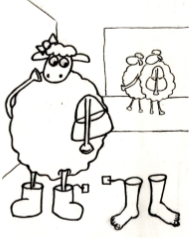In early December, PETA sent out a mass email with the subject heading, “UGGs = Dead Sheep.” PETA was referring to UGG shoes, the once-fashionable boots made of sheep skin.

As a vegetarian, I don’t eat meat because I have a problem with the unethical slaughter of animals. Naturally, because I am against abusing and killing animals, I’m also against wearing fur. After all, most fur farms kill the animals with genital and anal electrocution, neck-breaking, gassing and other painful methods. Sometimes animals are even skinned alive, sufficiently conscious to feel the fur ripped from their bodies.
According to their website, PETA focuses on four main sources of animal abuse: on factory farms, in the clothing trade, in laboratories and in the entertainment industry. Although I’m predisposed to support PETA’s cause, the UGG email baffled me.
PETA’s email discouraged consumers from purchasing UGGs and, as an alternative, told supporters to shop at the “tons of places that offer cute and comfortable cruelty-free boots, including stores like Forever 21, H&M, Charlotte Russe and Target.”
But Forever 21, H&M, Charlotte Russe and Target are all companies that are supplied by sweatshops, where human rights are violated and employees are exploited. How does PETA define “cruelty-free?” Apparently, their definition doesn’t extend to humans.
Even though PETA is strictly an animal rights organization that fights animal cruelty, it would be logically consistent to extend that philosophy towards human rights as well.
Unfortunately, it’s not uncommon for animal rights organizations to forget the rights of their fellow humans. The Humane Society of the United States, an animal protection organization, has a list of “Fur-Free Retailers, Designers and Brands,” on their website. That list includes several stores like H&M and Gap, which are supplied by sweatshops.
In December of 2010 in Dhaka, Bangladesh, a fire broke out on the ninth and 10th floors of a garment factory owned by the Ha-Meem Group, a company that provides clothing for stores, including H&M, Gap and Target — several of the stores labeled by PETA and The Humane Society as “cruelty-free.” According to The Guardian, at least 27 people died in the fire, and eyewitnesses reported that two of the emergency exits were closed. Workers trapped inside were jumping out of the windows to escape the building. Only three days earlier, three employees were killed during labor disputes there; they were demanding an unpaid government-mandated raise to the equivalent of $43 per month, reported The New York Times.
In August, 2005, meanwhile, the clothing company Charlotte Russe denied garment workers minimum wage and overtime while working in a downtown L.A. factory. Even more unsettling, according to an article in The Los Angeles Business Journal, one of the employees was working six days a week for more than 10 hours a day. She was also paid by the piece and wasn’t compensated for overtime.
Factories and methods like these — that don’t abide by health and safety conditions or laws of minimum wage and overtime — are certainly not cruelty-free if they are risking employees’ lives and not giving decent living wages.
Perplexed by PETA’s apparent endorsement of companies that are known to exploit human rights, I wrote them a concerned email and promptly received a response from Christiana Remick, membership correspondent for the PETA Foundation.
“No one organization can fight all moral and social crime,” said Remick in the email. “The American Heart Association fights heart disease but not cancer or any other disease, while Save the Children helps starving children but not disabled veterans.”
Of course, I am not suggesting that PETA pursue human rights in addition to animal rights. After all, the purpose of the organization is to fight for the ethical treatment of animals. Remick’s response, however, ignored the issue at hand: cruelty in general.
PETA has a lot of responsibility to uphold. Boasting over a million fans on Facebook, and with millions of supporters at their disposal, PETA has a strong voice and opportunity to create fundamental change. They should be careful with their messages since, as in the UGG email, they simultaneously combat and promote different forms of cruelty.
The principles upon which PETA is based, principles of ethics and justice, should apply to everything the company supports or invests in — they shouldn’t be limited to animals. They shouldn’t suggest companies that clearly negate human rights, labor laws and common decency.
Their intention was to show consumers that fur-free clothing is readily available — that you don’t need to harm a sheep to keep up with the UGGs trend. But they could also suggest ethical companies that adhere to fair labor standards and are also fur-free, such as American Apparel, People Tree, and even thrift or trade stores like Buffalo Exchange. By doing so, PETA will truly support a more ethical consumerism in line with their anti-cruelty mission statement.
I understand PETA’s desire to save innocent animals from becoming mere articles of clothing, but animals aren’t the only creatures who can experience cruelty. Just because clothing is fur-free doesn’t make it cruelty-free.







Leave a Reply